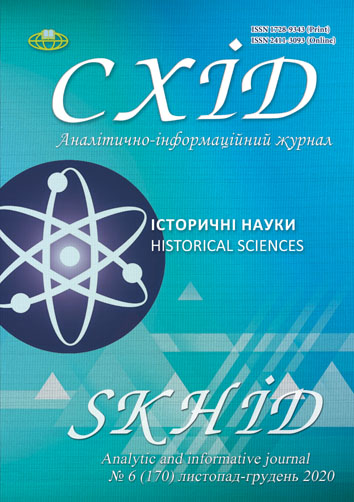MОUNIRA MAYA CHARRAD (NEW TRENDS IN HISTORICAL SCIENCE THROUGH THE PRISM OF PERSONALITY)
DOI:
https://doi.org/10.21847/1728-9343.2020.6(170).219948Keywords:
Mounira Maya Charrad, Historical Sociology, Gender History, Islamic WorldAbstract
In this article, the author analyzes new trends in historical science in the United States, which, during the period indicated in the article, developed on the basis of an interdisciplinary synthesis of existing methods of historical analysis with sociological ones. This trend passes through the prism of the scientific activities of the professor of the Department of Sociology at the University of Texas at Austin, Mounira Maya Sharad, a researcher in the field of political sociology, comparative historical sociology, social theory and gender politics in the countries of the Islamic world. The article contains an analysis of the initial period of the formation of Mounira as a scientist, who is a prominent representative of the postcolonial Tunisian intelligentsia, defines the vector of her scientific search for the traditional social structure of the Tunisian village and the status of Islamic women. Particular attention is paid to the influence of processes in American sociological science on the further professional activities of Mounira Charrad. Since the 1970s last century, historical sociology becomes the main vector of Mounira's study of social phenomena in the countries of the Middle East and North Africa and their typology, first of all, by the methods of comparative analysis, that is, by the method of corporate history.
Mounira Charrad's study of the status of Islamic women was carried out in the context of "women's history", which was a significant area of new social history in the United States. The focus of these studies was on the history of the legal system in the Maghreb countries and the differences between the family law systems of Tunisia, Algeria and Morocco were shown. A qualitatively new stage in the study of women in the Islamic world was Mounira's use of the methodology of gender-historical analysis developed by representatives of the American school of women's history. Mounira Charrad publishes a number of works in which she analyses the evolution and impact of public policy on gender in the Islamic world. The fundamental monograph by Mounira Charad “States and Women's Rights. The Making of Postcolonial Tunisia, Algeria, and Morocco”, which has received worldwide recognition among the scientific community, is a comprehensive analysis of the relationship between the state structures of the Maghreb countries with tribal, ethnic formations, primarily in the context of the legal system. The scientific activity of Mounira Charrad reflects the main new trends in American historical science of the last third of the XX - beginning of the XXI century.
Downloads
References
Charrad M., Suzman R., Miller K. (1976). Employment Effects on Fertility Control in Tunisia. In: Recent Empirical Findings on Fertility: Korea, Nigeria, Tunisia, Venezuela, Philippines. Smithsonian Institution, Washington, D.C.
Charrad, M. (1982) "Review" of Women in Muslim Family Law by J. L. Esposito. Sociological Analysis, 43 (4): 389-391.
Charrad, M. (1986). "Review" of Woman in the Muslim Unconscious by Fatna A. Sabbah. Middle East Studies Association Bulletin. 20 (2): 191-192.
Charrad, M. (2001). States and Women's Rights. The Making of Postcolonial Tunisia, Algeria, and Morocco. Berkeley, CA: University of California Press.
Charrad, M (2011). Gender in the Middle East: Islam, State, Agency. Annual Review of Sociology. 37: 417-437 doi: https://doi.org/10.1146/annurev.soc.012809.102554
Charrad, M. (2016). Living History Interview. The Journal of Gender, Race, and Justice. 18(2), 457-476
Charrad, M.& Jaster, D. (2015). Limits of Empire: The French Colonial State and Local Patrimonialism in North Africa. Patrimonial Capitalism and Empire. Political Power and Social Theory, Vol. 28., Emerald Group Publishing Limited, 63-89. doi: https://doi.org/10.1108/S0198-871920150000028003
Chernikh, I., Gladchenko, S. (2018). Teoriya modernizatsiyi ta realiyi afro–aziat·skoyi modernizatsiyi (sotsiokulʹturnyy rakurs). Gileya. 130 (3): 151-154.
Duvignaud, J. (1968). Chebika: Mutations dans un village du Maghreb. Étude sociologique. GALLIMARD; French Language Edition.
McGovern, Patrick (2010). The young Lipset on the iron law of oligarchy: a taste of things to come1. The British Journal of Sociology. 61 (Suppl 1): 29–42. doi:10.1111/j.1468-4446.2009.01283.x.
Mur, Barrington. (2016). Sotsialnyye istoki diktatury i demokratii: rol pomeshchika i krest'yanina v sozdanii sovremennogo mira [Translat. drom Engl.]. Moscow: Vyshaya shkola ekonomiki. (In Russian)
Sabbah, F. (1984). Woman in the Muslim Unconscious. Pergamon
Swidler, A. (1986). Culture in Action: Symbols and Strategies. American Sociological Review. 51 (2): 273–286. doi: https://doi.org/10.2307/2095521
Downloads
Published
How to Cite
Issue
Section
License
Copyright (c) 2020 Svitlana Hladchenko

This work is licensed under a Creative Commons Attribution-NonCommercial-NoDerivatives 4.0 International License.
1. Authors bear responsibility for the accuracy of facts, quotations, numbers and names used.
2. Manuscripts are not sent back.
3. The publisher does not always agree with the authors' opinion.
4. The authors reserve the right to authorship of the work and pass the first publication right of this work to the journal under the terms of a Creative Commons Attribution-NonCommercial-NoDerivatives 4.0 International License. This license allows others to distribute (copy) the published work for non-commercial purposes, provided there is mandatory attribution to its authors and a link to the first publication in our journal.
5. The authors have the right to conclude separate supplement agreements that relate to non-exclusive work distribution in the form in which it has been published by the journal (for example, to upload the work to the online storage of the journal or publish it as part of a monograph), provided that the reference to the first publication of the work in this journal is included.

